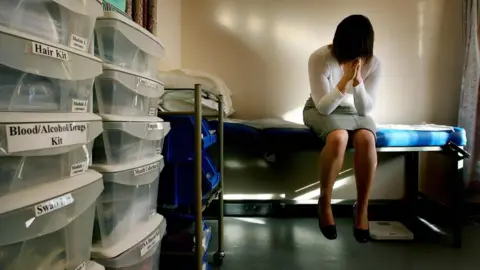Met Police accused of 'invading' rape victims' privacy
 PA
PAA woman said she felt pressured into giving police access to personal information going back 30 years so they could investigate her rape claim.
London's Victim's Commissioner has called the Metropolitan Police's data gathering in rape cases "unlawful".
As first reported in the Guardian police forces, including the Met, are demanding access to highly personal data from potential rape victims.
"In rape cases digital communication is often a key enquiry," the Met said.
'Gross invasion of privacy'
The woman reported a rape earlier this year that took place in 2010 in central London.
After contacting police she was asked to sign a form allowing officers access to all data on her devices.
She claims the police did not properly explain what she was signing.
She later found out the data would subsequently be held for 100 years post-trial, even if the verdict came back as not guilty.
The police printed off private unrelated conversations with her partner and friends, and were able to access audio files of her phone calls.
"I think that I've suffered a gross invasion of privacy," she said.
"I've been treated as if I'm a liar, I think that I've been treated as if I'm a suspect and interrogated and kept under surveillance, that's the consequence of their policy," she said.
"I had no right to say hang on a minute this is my private stuff, what you doing looking at my private stuff."
 Mayor of London
Mayor of LondonIn a letter to the Information Commissioner's Office, Claire Waxman, London's Victim's Commissioner, wrote: "Victims often don't feel it useful, relevant or reasonable, but have to give consent it if they want to access justice.
"The justice process has just lot a grip on this; on the ground it is getting worse and worse."
A Met Police spokesman said: "Officers are trained to follow evidence wherever it may lead and to carefully consider the legal framework for their enquiries alongside issues of proportionality and necessity in each case.
"We have worked with our key partners over the last year in developing a letter which is provided to victims of rape and serious sexual assault explaining why we may need to assess and view their digital data, and how this is considered on a case-by-case basis.
"This may also include medical and other third party material."
